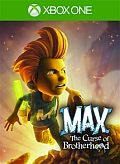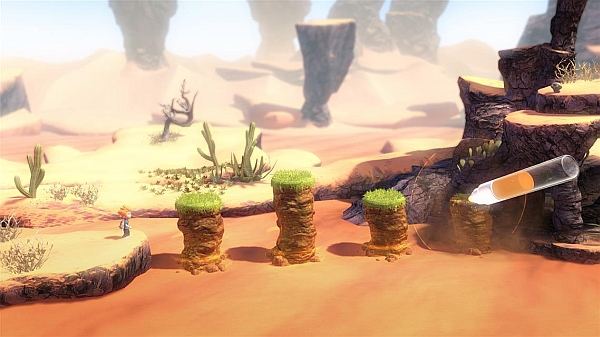
With a new generation of games upon us, it’s important to think about what I want out of video games going forward. Games like Battlefield, FIFA, Call of Duty, and Madden have finally hit the threshold of how much I can take. Don’t get me wrong, they are all great games… except for, well, Call Of Duty: Ghosts. Max: The Curse of Brotherhood is a platformer, meaning it’s different enough to those games to to hold my interest. Sadly, it is not great enough to be a total must-own.
Platforms: Xbox One
Publisher: Microsoft Studios
Developer: Press Play
Genre: Puzzle Platformer… With Markers
Release Date: December 20, 2013
ESRB Rating: Everyone 10+
 In The Curse of Brotherhood, a sequel to the WiiWare/PC/PSN title Max and the Magic Marker, you play as the titular Max, who gets annoyed with his tedious little brother and wishes him away with a spell he found on the Internet. An evil-looking portal opens in the bedroom wall and his sibling is plucked from our world by a humongous hairy claw and deposited in a magical place called Anotherland. Max decides to go in after the brother he just condemned.
In The Curse of Brotherhood, a sequel to the WiiWare/PC/PSN title Max and the Magic Marker, you play as the titular Max, who gets annoyed with his tedious little brother and wishes him away with a spell he found on the Internet. An evil-looking portal opens in the bedroom wall and his sibling is plucked from our world by a humongous hairy claw and deposited in a magical place called Anotherland. Max decides to go in after the brother he just condemned.
When you arrive in Anotherland, the first thing you notice is the art style. The beautiful, two-dimensional backgrounds with cartoonish 3D platforms to jump across are fantastic. There is a chunky feeling that makes TCoB feel like a modern take on Chuck Jones cartoons, alongside a vibrancy that makes the world pop. Also, the minimal user interface gives you a full view of the gorgeous world.
After a few minutes in Anotherland, Max encounters an old lady who becomes one with Max’s marker pen, granting it magic powers, alongside allowing her to tutorialize throughout the duration of the adventure. Max must make use of the magic marker, and its growing number of powers, to travel through Anotherland, find his brother, and rescue him from the evil Mustacho. It’s a fine setting to frame the action and the character designs are actually really awesome; however, the plot and characters are not really explored throughout the handful of hours it takes to finish the game. They would be much more suited to an actual cartoon, where the Max, his brother, and Mustacho could be far more fleshed out.
And how does Max travel across Anotherland? Running, jumping, and his magic marker. The control is, for the most part, really tight. The jumping feels almost spot on, despite Max sometimes falling short of where you think you can land. The only part that feels off is the climbing up and dropping down, which never works quite right. Pulling the right trigger on your controller stops Max in his tracks, and the magic marker whips out of his pocket and appears on screen. When running and jumping cannot get you through the environment, the magic marker can pull vines, plants, water, or fire out of nodes in the landscape so Max can progress.

It works. Using the marker adds a layer of complexity to the platforming that make the gameplay more interesting. However, controlling the marker is very clunky. You direct your elemental power with the left analogue stick, which feels off. It’s here that it becomes blatantly obvious that the developers, Press Play, wanted to build Max: The Curse of Brotherhood for Nintendo’s controller, like its predecessor. For the way the control feels, when directing the magic marker, a touchscreen makes much more sense, especially when the game sometimes requires a high amount of precision.
Despite the control missteps, the first few times you puzzle your way through the world with the magic marker, it’s good fun. But despite the puzzles being different and more challenging as you go on, the control issues, combined with weird checkpointing system, turn The Curse of Brotherhood from a reasonably enjoyable platform puzzler into a horrible trial-and-error grind.
Really, it’s hard to know who Max: The Curse of Brotherhood is aimed at. It’s a story with characters built for a child’s cartoon, wrapped in a sometimes complex puzzler on a platform where the controls do not really work. It’s a shame, as I’m totally down with a game of this ilk, especially on the Xbox One, where quality and quantity of the the small downloadable space is sketchy at best (pun very much intended).

Review Disclosure: A review copy of Max: The Curse of Brotherhood was provided by Press Play for the purposes of this review.







